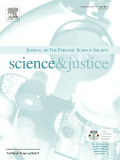
SCIENCE & JUSTICE
Scope & Guideline
Empowering Justice Through Scientific Inquiry.
Introduction
Aims and Scopes
- Forensic Methodologies and Techniques:
Focuses on the development and validation of novel forensic techniques and methodologies, including advanced imaging technologies, chemical analysis, and DNA profiling methods. - Forensic Applications of Technology:
Explores the integration of cutting-edge technologies such as artificial intelligence, machine learning, and augmented reality in forensic science, enhancing investigative processes and evidence analysis. - Interdisciplinary Research:
Encourages collaborations across various disciplines, including anthropology, biology, chemistry, and digital forensics, to address complex forensic challenges and improve investigative outcomes. - Ethical and Legal Considerations in Forensics:
Addresses the ethical implications and legal frameworks surrounding forensic practices, particularly in relation to evidence handling, data privacy, and the use of forensic evidence in court. - Environmental and Contextual Forensics:
Investigates the role of environmental factors and contextual elements in forensic analysis, including the study of trace evidence, decomposition processes, and the use of environmental DNA.
Trending and Emerging
- Digital Forensics and Cybersecurity:
An increasing number of publications focus on digital forensics, including the analysis of digital evidence, cybersecurity threats, and the implications of digital data in criminal investigations. - Forensic Genetics and DNA Analysis:
Research on advanced DNA analysis techniques, including next-generation sequencing and probabilistic genotyping, has gained traction, reflecting the critical role of genetics in forensic identification. - Integration of Artificial Intelligence (AI) in Forensics:
There is a growing interest in the application of AI and machine learning algorithms for predictive modeling, evidence analysis, and enhancing forensic methodologies. - Environmental Forensics and eDNA:
The use of environmental DNA (eDNA) for wildlife crime investigations and other forensic applications is emerging as a key area of research, emphasizing the intersection of ecology and forensics. - Ethics in Forensic Science:
A noticeable trend towards exploring ethical issues in forensic science, including the implications of bias, data privacy, and the responsibilities of forensic practitioners, is becoming more prominent in recent publications.
Declining or Waning
- Traditional Forensic Evidence Collection Techniques:
There has been a noticeable decrease in research focusing on conventional evidence collection methods, as newer technologies and methodologies become more prevalent in forensic practice. - General Crime Scene Management Practices:
The emphasis on generic crime scene management techniques appears to be waning, with more focus shifting towards specific forensic applications and technological innovations. - Non-Scientific Approaches to Forensic Analysis:
Papers that rely on anecdotal evidence or non-scientific methodologies are becoming less frequent, as the journal prioritizes rigorous scientific approaches and empirical research.
Similar Journals
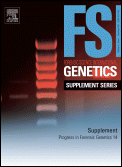
Forensic Science International Genetics Supplement Series
Transforming forensic investigations through genetic insights.Forensic Science International Genetics Supplement Series, published by Elsevier Ireland Ltd, is an essential resource for professionals, researchers, and students engaged in the increasingly critical intersection of genetics and forensic science. This peer-reviewed journal, with an ISSN of 1875-1768 and E-ISSN of 1875-175X, provides a platform for disseminating innovative research findings and methodologies that enhance the application of genetic techniques in forensic investigations. The journal has gained recognition within the academic community, evidenced by its notable rankings in Pathology and Forensic Medicine as well as Genetics, placing it in Q3 and Q4 quartiles respectively in 2023. Although it operates without an open access model, its targeted converged years—spanning from 2008 to 2022—exemplify a commitment to fostering ongoing advancements in forensic genetics. Despite its positioning, the journal remains a significant contributor to public discourse, with an emphasis on the role of genetics in legal contexts and the continual evolution of forensic methodologies.
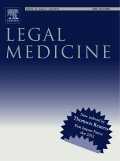
Legal Medicine
Advancing the ethics of forensic science.Legal Medicine, ISSN 1344-6223, published by ELSEVIER IRELAND LTD, stands as a pivotal academic journal within the realms of forensic medicine and legal ethics. Operating from the Netherlands, this journal has established a strong reputation among researchers and practitioners since its inception in 1999, with the goal of advancing knowledge in the intersection of legal and medical disciplines. With a commendable Q2 categorization in both Issues, Ethics and Legal Aspects and Pathology and Forensic Medicine, it ranks among the noteworthy publications in these fields, placing it in the 51st percentile for Pathology and Forensic Medicine and 51st for Nursing-related ethical issues. The journal not only serves as a repository for innovative research and practical case studies but also emphasizes the importance of ethical considerations in medical legal scenarios. Although it does not offer Open Access options, it remains a crucial resource for professionals, researchers, and students seeking to stay informed about the latest developments that shape legal medicine. Access to its contents promises to enhance understanding and inspire advancements in both forensic science and the ethical frameworks surrounding them.

Proceedings of the Institution of Civil Engineers-Forensic Engineering
Advancing Safety Through Forensic InsightsProceedings of the Institution of Civil Engineers - Forensic Engineering is a pivotal journal in the field of forensic engineering, published by Emerald Group Publishing Ltd, a renowned name in academic publishing. With a focus on investigating and understanding the failures of civil engineering structures, this journal provides a critical platform for the dissemination of research and case studies aimed at enhancing safety, risk, and reliability in engineering practices. It holds an important place in the Q4 quartile of the Safety, Risk, Reliability and Quality category as of 2023, and currently ranks #123 out of 207 in its field according to Scopus, reflecting its emerging influence despite its relatively recent establishment in 2011. Researchers, practitioners, and students alike will find valuable insights through non-open access articles that contribute to a deeper understanding of forensic analysis in civil engineering contexts. The journal's mission is to promote discussions that lead to significant advancements in civil engineering safety and reliability, ultimately informing best practices and policy-making in the profession.
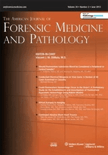
AMERICAN JOURNAL OF FORENSIC MEDICINE AND PATHOLOGY
Exploring the Intersection of Medicine and LawThe American Journal of Forensic Medicine and Pathology is a pivotal publication within the field of forensic science and pathology, dedicated to disseminating influential research and advancements in the evaluation of death and injury in legal contexts. Published by Lippincott Williams & Wilkins, this journal, which has been in circulation since 1980, serves as a vital resource for professionals, researchers, and students focused on intersecting disciplines such as medicine and forensic investigations. While it holds a respectable Q3 ranking in both the Medicine (Miscellaneous) and Pathology and Forensic Medicine categories as of 2023, the journal's impact is underscored by its contributions to the ongoing dialogue on forensic practices and methodologies. The American Journal of Forensic Medicine and Pathology provides a platform for innovative papers that shape the future of forensic science, also offering insights through case studies, reviews, and research articles that cater to its diverse readership. With an ISSN of 0195-7910 and E-ISSN 1533-404X, the journal continues to support the scholarly community in advancing knowledge within this critical field.

Scandinavian Journal of Forensic Science
Empowering forensic practitioners with cutting-edge research.The Scandinavian Journal of Forensic Science is a premier open-access journal published by SCIENDO since 2012, dedicated to advancing the field of forensic science. With its ISSN 2353-0707, this journal provides a platform for researchers, professionals, and students to disseminate their findings on various aspects of forensic investigations, including but not limited to forensic biology, chemistry, toxicology, and crime scene analysis. The journal plays a vital role in promoting collaboration and knowledge exchange among forensic practitioners and academics, ensuring that cutting-edge research is accessible to all. As a part of the reputable SCIENDO publishing group, the Scandinavian Journal of Forensic Science upholds high standards of peer review and editorial rigor, making it an essential resource for those involved in the forensic science community. Readers can benefit from its open-access model, which fosters wide dissemination and enhances the visibility of published works, ultimately contributing to the societal impact of forensic research.
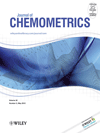
JOURNAL OF CHEMOMETRICS
Bridging Chemistry and Mathematics for Enhanced UnderstandingJOURNAL OF CHEMOMETRICS is a prestigious journal published by Wiley that has been a cornerstone in the fields of analytical chemistry and applied mathematics since its inception in 1992. With an ISSN of 0886-9383 and an E-ISSN of 1099-128X, this journal occupies a notable position, reflected in its Scopus rankings where it holds the 90th rank in Applied Mathematics and the 56th rank in Analytical Chemistry. The journal, based in the United Kingdom, spans a converged publication timeline through 2024, meticulously exploring the interplay between chemical data analysis and mathematical methodologies. Though currently not open access, it offers essential insights through high-quality research articles that significantly contribute to advancing the understanding of chemometric techniques and their applications. With an impact factor demonstrating robust academic recognition, the JOURNAL OF CHEMOMETRICS serves as an invaluable resource for researchers, professionals, and students aiming to excel in the ever-evolving landscape of chemical data interpretation.

Journal of Forensic and Legal Medicine
Bridging Disciplines for Better Legal Outcomes.The Journal of Forensic and Legal Medicine, published by Elsevier, stands at the forefront of interdisciplinary research in the overlapping domains of law, medicine, and forensic science. With an ISSN of 1752-928X and an E-ISSN of 1532-2009, this esteemed journal covers pivotal advancements in the field, spanning from 2007 to 2024. The journal enjoys a distinguished reputation, evidenced by its Q1 ranking in Law and its notable positions in the Scopus Ranks with an 82nd percentile in Social Sciences—Law. As a crucial resource for researchers, practitioners, and students alike, the journal focuses on the vital role of forensic evidence in legal contexts, ensuring the dissemination of high-quality, peer-reviewed articles that contribute to both academic and practical applications in the realm of forensic and legal medicine. Its accessibility to a broad audience, despite not being open access, bolsters its importance in advancing forensic science, policy-making, and medical jurisprudence worldwide.
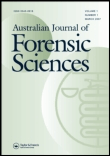
Australian Journal of Forensic Sciences
Connecting Researchers to the Heart of Forensic InnovationThe Australian Journal of Forensic Sciences, published by Taylor & Francis Ltd, stands as a pivotal resource in the field of forensic medicine and pathology. With an ISSN of 0045-0618 and an E-ISSN of 1834-562X, this esteemed journal has been at the forefront of forensic research since its inception in 1968. Currently classified in the Q2 category for the year 2023 within its domain, it ranks 92nd out of 208 journals, placing it within the 55th percentile in Scopus rankings. The journal's scope encompasses a diverse range of topics critical to the advancement of forensic sciences, making it an essential platform for researchers, professionals, and students seeking to stay abreast of the latest developments and methodologies in the field. Although not an open-access publication, the journal serves as a crucial conduit for disseminating high-quality research, contributing significantly to the ongoing evolution of forensic practice and knowledge.
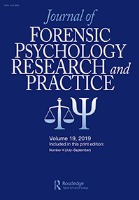
Journal of Forensic Psychology Research and Practice
Navigating the Psychological Dimensions of Crime and Law.Journal of Forensic Psychology Research and Practice is a distinguished publication within the fields of Applied Psychology and Pathology and Forensic Medicine, published by Routledge Journals, Taylor & Francis Ltd. With a commitment to advancing knowledge from 2017 to 2024, this journal aims to bridge theory and practice by showcasing empirical research, including case studies and innovative methodologies, that address the complexities of forensic psychology in contemporary settings. While it holds a respectable Q3 ranking in both Applied Psychology and Pathology and Forensic Medicine, making it a vital resource for scholars and practitioners alike, its insights contribute significantly to understanding the psychological aspects of criminal behavior and legal processes. Researchers, professionals, and students are encouraged to engage with its content to further their understanding and application of forensic psychology principles in real-world scenarios.

Forensic Science International-Digital Investigation
Unlocking Insights in Digital Evidence AnalysisForensic Science International-Digital Investigation, published by Elsevier Science Ltd, stands at the forefront of multidisciplinary research in the realm of digital forensics and forensic science. With an impressive impact factor and recognition as a Q1 journal in critical categories such as Law and Medical Laboratory Technology, it has established itself as an essential resource for researchers, practitioners, and students alike. Its open access policy promotes broad dissemination of cutting-edge findings, facilitating collaboration and innovation in this ever-evolving field. Covering topics from computer science applications to forensic medicine, it addresses the complexities of digital evidence analysis in today's technology-driven world. As it converges from 2020 to 2024, the journal reflects ongoing advancements and profound challenges faced in forensic investigations, making it a vital platform for sharing knowledge and fostering scholarly dialogue.